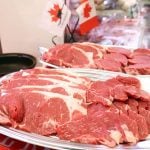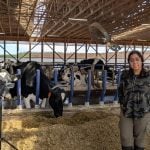The feeder cattle market feels like a falling dagger — and trying to pick a bottom can be painful. Western Canadian auction markets saw heavier replacements over 800 lbs. fall $8-$12 compared to last week; calves were generally $5-$8 below week-ago levels.
Feedlot buying interest was once again limited to two or three major operations setting the market structure at most sales, while the others sat on the sidelines. Cattle feeders are carrying sufficient numbers, with Alberta and Saskatchewan feedlot inventories are running seven per cent above year-ago levels. Scale-down buying has been in vain as the deferred live cattle futures made fresh contract lows this week.
Read Also

China to buy 12 million metric tons of soybeans this season, Bessent says
U.S. Treasury Secretary Scott Bessent said on Thursday that China has agreed to buy 12 million metric tons of American soybeans during the current season through January and has committed to buying 25 million tons annually for the next three years as part of a larger trade agreement with Beijing.
Black medium- to lower-flesh steers weighing 900 lbs. traded just over $160. Medium-frame mixed red steers with lower flesh averaging just over 800 lbs. sold for $180 in southern Alberta; however, this was on the higher end of the range, as similar-weight cattle readily traded from $172 to $181. The market was slightly lower in Saskatchewan and Manitoba. Order buyers were lonely, the odd phone call providing false hope like the date that cancelled last minute. Feedlot buying interest was sharply below market levels providing little support during the slide.
Feedlot interest for lighter calves was also sparse, while the farmer/cattle producer continues to seed or prepare equipment. Steers averaging just over 500 lbs. were readily quoted from $220 to $225 across the Prairies; mixed steers averaging just under 650 lbs. were quoted at $223 in Lethbridge while heifers around 600 lbs. were reported at $185.
U.S. feeder cattle prices were also down $8-$10 from last week as fed cattle in the southern Plains traded $3-$4 lower, averaging $124. We’ve seen U.S. dressed sales drop $20 in just two weeks and this shock has frozen feedlot operators on both sides of the border. U.S. weekly beef production surged again, coming in 6.3 per cent above last year, confirming the market is functioning to encourage demand.
— Jerry Klassen is manager of the Canadian office for Swiss-based grain trader GAP SA Grains and Produits. He is also president and founder of Resilient Capital, which specializes in proprietary commodity futures trading and commodity market analysis. Jerry owns farmland in Manitoba and Saskatchewan but grew up on a mixed farm/feedlot operation in southern Alberta, which keeps him close to the grassroots level of grain and cattle production. Jerry is a graduate of the University of Alberta. He can be reached at 204-504-8339.












